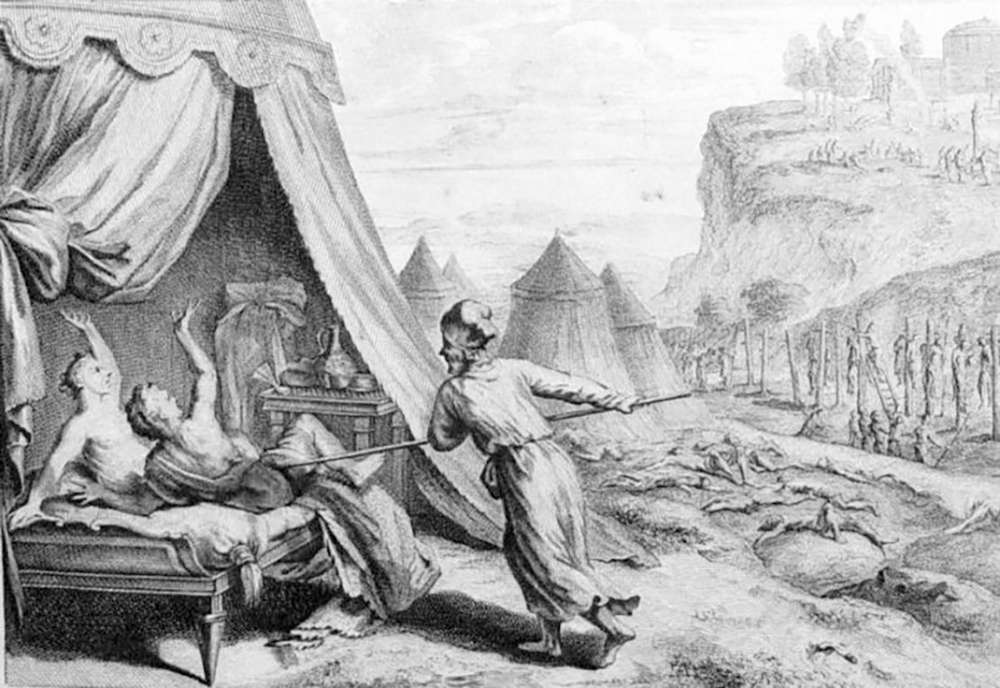By: Rabbi Osher Jungreis
When should you speak out and when should you remain silent? To what extent do you have to take responsibility and when should you remain passive? In our culture, it is politically correct to mind your own business, keep your nose clean and not become enmeshed in situations that are sensitive and difficult. Our parsha teaches us differently.
Pinchas, the grandson of Aaron, is awarded G-d’s Covenant of Peace and Priesthood. What is the reason for this awesome privilege? The Torah gives us the answer: “Because he took vengeance for his G-d.” (Numbers 25:13).
The passage should give us pause. What is the Torah trying to impart to us by referring to HaShem as the G-d of Pinchas exclusively? Isn’t He the G-d of all of us?
In time of crises, when you have to put yourself on the line in defense of a cause, when you have to battle injustice, corruption, immorality and evil, it is easy to rationalize and justify complacency by stating “It’s not my concern. Let others speak out. After all, G-d is the G-d of everyone, so why should I be the one to take up His cause? Why should I be the one to assume responsibility?
But if you feel that G-d is your personal G-d, if you love G-d with all your heart and all your soul, then you cannot bear to see His honor desecrated, and you feel compelled to cry out in His defense. Therefore, our sages advise us to write for ourselves two notes. ..one for each pocket–the first stating, “For me, the world was created, meaning that “I am responsible. It’s all up to me”. I cannot shirk my duty and scapegoat, and even if the entire world is complacent, corrupt and immoral, I dare not be.” This is all valid when it comes to injustice and desecration of G-d’s Name.
On the second note however, we are to write “I am nothing but dust and ashes”–meaning that, when it pertains to our own personal Kavod/honor, our own position, our own parking place, our own esteem–we must be forgiving and forego our honor.
Pinchas never considered his own honor–only that of G-d. Thus, he made G-d his personal G-d, Pinchas could have rationalized–why should I get involved let Moses and Aaron be the ones to combat immorality, but Pinchas assumed responsibility. It is for this reason that he was rewarded with the eternal covenant of Priesthood and Peace. Even as Pinchas, we too must have the courage to speak out and unafraid raise our own voices on behalf of our G-d, our Torah and our people. We must do our share to restore peace and harmony to a world gone mad.
CAPTURING THE ESSENCE OF TORAH
If someone were to challenge you as to which passage from the Torah most poignantly reflects the essence of G-d`s Holy Book, which would you choose? Our sages had much discussion on the subject. Some advocated “Shema Yisrael”, for the Shema proclaims the One-ness of G-d, the credo of our people; others recommended “Love thy neighbor as thyself,” which can truly be a life-transforming experience if you follow its dictates, and still others suggested the Ten Commandments.
As important and fundamental as all these teachings are, our sages have chosen a totally different commandment, one that is relatively unknown, a mitzva from this week`s parsha that, if followed, our sages assure us, will have lasting impact on our lives.
At the end of this week`s parsha (Numbers, 28), G-d commands us to bring an offering for the Temple called, “Olas Tamid”, an offering that had to be brought every single day. You might wonder why our sages consider this passage to be the essence of the Torah….There is a profound wisdom in this choice which reflects the importance of consistency in face of man`s instability. It is easy to be enthusiastic, to soar with fervor, zeal, and passion at the inception of any undertaking, but to maintain that commitment on an ongoing basis is the test of human character.
We all have visions and dreams in which we are convinced that we would do such and such only to see those dreams dissipate with the passage of time. The first time we lit candles, the first time we put on a tallis, were special moments in our lives in which our spirits soared with love for HaShem. But have we been able to maintain these emotions? Do we still feel that love, that sanctity?
This holds true for all our relationships. How often does it happen that, on special occasions, (wedding day, birth of a child) or in moments of crisis such as illness, we make resolutions only to see them vanish with the passage of time? Therefore, our sages taught us that the key element in any relationship is consistency. It is only through consistency that true commitment is demonstrated.
It’s easy to be inspired to change for a moment, but the real sign of our devotion is whether we can retain that devotion throughout our lives during good as well as difficult times. So yes, this is the passage to bring offerings day in and out that best conveys the essence of the Torah, for we must maintain our Jewish commitment throughout our lives. Our loyalty must be ongoing — from day to day, from year to year, from generation to generation, spanning the centuries.





